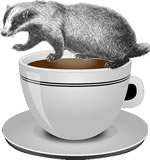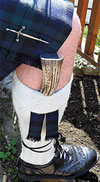While flicking through my Scots language course, Luath Scots Language Learner, this week I discovered that the Scots for every day is ilka dae, which is quite similar to the Dutch elke dag, which I also learnt recently – I like finding connections like this. Neither resembles the English version, or the German jeden Tag. The words for every in other Germanic languages are also different: hver/alle in Danish, hver/enhver/all Norwegian, and var/all in Swedish.
The Scots word ilka [ˈɪlkə], which is also written ilkae and ilkie, means every and each. It appears in such expressions as:
– ilka bodie = everyone
– ilka thing = everything
– ilka ane (yin/een) = each one, every one
– ilkaday = everyday
– ilka where = everywhere
According to the OED ilka is a combination of ilk (every) and a (the indefinite article): ilk is a northern and north-midland form of ilch, iche = southern ælch, æche (each), which come from the Old English ǽlc, which is related to the Old Frisian ellîk/elk/êk, and the Dutch elk, from the Old High German eogilîh.
Sources: bab.la Dictionary, Reverso, DSL, EUdict, OED



